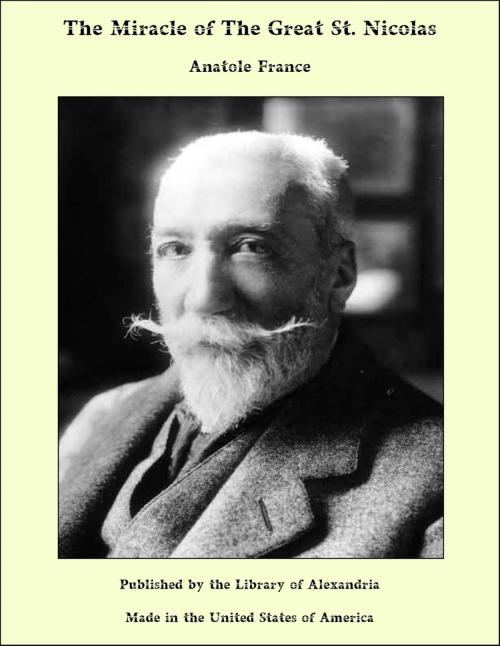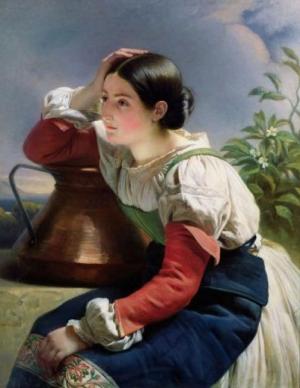The Miracle of The Great St. Nicolas
Nonfiction, Religion & Spirituality, New Age, History, Fiction & Literature| Author: | Anatole France | ISBN: | 9781465604934 |
| Publisher: | Library of Alexandria | Publication: | March 8, 2015 |
| Imprint: | Language: | English |
| Author: | Anatole France |
| ISBN: | 9781465604934 |
| Publisher: | Library of Alexandria |
| Publication: | March 8, 2015 |
| Imprint: | |
| Language: | English |
NICOLAS, a scion of an illustrious family of Vervignole, showed marks of sanctity from his earliest childhood, and at the age of fourteen vowed to consecrate himself to the Lord. Having embraced the ecclesiastical profession, he was raised, while still young, by popular acclamation and the wish of the Chapter, to the see of St. Cromadaire, the apostle of Vervignole, and first Bishop of Trinqueballe. He exercised his pastoral ministry with piety, governed his clergy with wisdom, taught the people, and feared not to remind the great of Justice and Moderation. He was liberal, profuse in almsgiving, and set aside for the poor the greater part of his wealth. His castle proudly lifted its crenelated walls and pepper-pot roofs from the summit of a hill overlooking the town. He made of it a refuge where all who were pursued by the secular arm might find a place of refuge. In the lower hall, the largest to be seen in all Vervignole, the table laid for meals was so long that those who sat at one end saw it lose itself in the distance in an indistinct point, and when the torches upon it were lighted it recalled the tail of the comet which appeared in Vervignole to announce the death of King Comus. The holy St. Nicolas sat at the upper end. There he entertained the principal folk of the town and of the kingdom, and a multitude of clergy and laymen. But on his right there was always reserved a seat for the poor man who might come begging for his bread at the door. Children, particularly, aroused the solicitude of the good St. Nicolas. He delighted in their innocence, and he felt for them with the heart of a father and the bowels of a mother. He had the virtues and the morals of an apostle. Yearly, in the dress of a simple monk, with a white staff in his hand, he would visit his flock, desirous of seeing everything with his own eyes; and in order that no adversity or disorder should escape his notice he would traverse, accompanied by a single priest, the wildest parts of his diocese, crossing, in winter, the flooded rivers, climbing mountains, and plunging into the thick forests. One day, having ridden since dawn upon his mule, in company with the Deacon Modernus, thorny thickets through which his mount with difficulty forced a winding path. The Deacon Modernus followed him with much difficulty on his mule, which carried the baggage.
NICOLAS, a scion of an illustrious family of Vervignole, showed marks of sanctity from his earliest childhood, and at the age of fourteen vowed to consecrate himself to the Lord. Having embraced the ecclesiastical profession, he was raised, while still young, by popular acclamation and the wish of the Chapter, to the see of St. Cromadaire, the apostle of Vervignole, and first Bishop of Trinqueballe. He exercised his pastoral ministry with piety, governed his clergy with wisdom, taught the people, and feared not to remind the great of Justice and Moderation. He was liberal, profuse in almsgiving, and set aside for the poor the greater part of his wealth. His castle proudly lifted its crenelated walls and pepper-pot roofs from the summit of a hill overlooking the town. He made of it a refuge where all who were pursued by the secular arm might find a place of refuge. In the lower hall, the largest to be seen in all Vervignole, the table laid for meals was so long that those who sat at one end saw it lose itself in the distance in an indistinct point, and when the torches upon it were lighted it recalled the tail of the comet which appeared in Vervignole to announce the death of King Comus. The holy St. Nicolas sat at the upper end. There he entertained the principal folk of the town and of the kingdom, and a multitude of clergy and laymen. But on his right there was always reserved a seat for the poor man who might come begging for his bread at the door. Children, particularly, aroused the solicitude of the good St. Nicolas. He delighted in their innocence, and he felt for them with the heart of a father and the bowels of a mother. He had the virtues and the morals of an apostle. Yearly, in the dress of a simple monk, with a white staff in his hand, he would visit his flock, desirous of seeing everything with his own eyes; and in order that no adversity or disorder should escape his notice he would traverse, accompanied by a single priest, the wildest parts of his diocese, crossing, in winter, the flooded rivers, climbing mountains, and plunging into the thick forests. One day, having ridden since dawn upon his mule, in company with the Deacon Modernus, thorny thickets through which his mount with difficulty forced a winding path. The Deacon Modernus followed him with much difficulty on his mule, which carried the baggage.















